Are you a current student?

ACVN Diploma IN CLINICAL VETERINARY NURSING
ENROLMENTS FOR NEXT INTAKE CLOSE IN:
ENROLMENTS & INTAKES
- Intakes start monthly, beginning on the first Monday.
- Enrolments close on the 15th day of the month prior unless filled early.
- Pay Today, Start Tomorrow available.
Entry Requirements:
- 18 years old
- Employed in a veterinary practice
- Legally able to perform veterinary nursing tasks in your country of residence
Duration:
3 years (+ 3yrs extension available)
language:
English
Access to our Online Learning Centre:
Yes
Printed Learner's Guides:
Yes
Need to attend campus:
No
Schedule type:
Flexible. Study when it suits you.
DUAL ENROLMENT:
Yes, you can dual enrol into the ACM40418 Cert IV in Veterinary Nursing
Not sure if this is the right course for you?
Answer a few easy questions and find out in less than a minute.
find out nowBECAUSE VETERINARY NURSES ARE SUPERHEROES
Veterinary Nurses are the backbone of every veterinary clinic, and it’s a profession that calls for both skill and dedication, as well as a genuine love for animals.
The ACVN Diploma in Clinical Veterinary Nursing is designed to encompass the essential requirements of veterinary nursing standards worldwide while providing the flexibility to explore issues specific to your country of residence.
This comprehensive course is rich with relevant information that current students find immensely valuable. They are amazed at how quickly they can apply their newfound knowledge to adapt and enhance clinic protocols within just a few months of study.
The course content is authored and delivered by highly knowledgeable and skilled Veterinary Nurses, ensuring you receive the best education possible. You will be equipped with the necessary skills to become an exceptional nurse, a valuable asset to your clinic, and a strong advocate for your patients.
Embark on this journey with the ACVN Diploma in Clinical Veterinary Nursing, and unlock your potential to become an outstanding veterinary nurse, making a meaningful difference in the lives of animals and contributing to the growth of the veterinary care profession.
The ACVN Diploma in Clinical Veterinary Nursing is a comprehensive course designed to meet international veterinary nursing competencies.
This program equips you with practical and theoretical knowledge in various aspects of veterinary nursing, ensuring you become a competent and compassionate Veterinary Nurse. The focus on meeting international standards allows this qualification to be very portable. With this diploma, you’ll be well-prepared to make a positive impact in your veterinary clinic, providing excellent care to your patients.

Enrol today and embark on a fulfilling journey in the world of veterinary care.
As an ACVN Nurse, you’ll be more than just the veterinarian’s assistant. Your role will encompass a diverse range of tasks and responsibilities, all while caring for a variety of patients.
Each day will bring new challenges and experiences. In the surgical theatre, you’ll diligently monitor anaesthesia, assist in surgeries, sterilise instruments, and provide vital post-operative care. Within the wards, you’ll tend to the needs of different animals, administering medications, provide husbandry, and that all important comforting care.
Veterinary nurses are lucky – we get to work with animals and people alike! Whether at the front of the clinic assisting with consults and scheduling appointments or offering advice to pet owners, your compassionate touch will shine through.
Embrace the fulfilling journey of becoming an ACVN Veterinary Nurse, where each day brings a sense of purpose, and your dedication to professionalism and education elevates your impact in the lives of animals and their loving owners.
apply nowEligibility Requirements
To be eligible to enrol in this course, you must:
- Be at least 18 years old
- Employed in a veterinary practice
- Legally able to undertake veterinary nursing tasks in your country of residence

If you don’t meet the above criteria, please look at our Foundation Certificate in Veterinary Assisting as a pathway to gaining the required knowledge for a junior vet nurse.
We have specially designed this course to meet international veterinary nursing education standards, focussing on the European Standards.
Once complete, you will receive a certificate, statement of results, and a syllabus outline showing the course content so employers or certifying boards can verify the depth of the qualification.
apply nowACVN DIPLOMA IN CLINICAL VETERINARY NURSING
For this certification to be awarded, you must complete the following subjects:
- SAHT Safe Animal Handling Techniques
- WHSV Health & Safety at Work
- ANAT Anatomy & Physiology
- WELL Wellbeing & Self Care
- COMM Communications
- INFV Infection Control in the Veterinary Clinic
- FNCA Foundations of Nursing Care
- NCPL Nursing Care Plans
- PHRM Pharmacology
- PAIN Pain Management
- NPRO Nursing Procedures
- WMDA Wound Management & Dressings
- PHYS Physical Therapy
- PATH Clinical Pathology
- IMAG Diagnostic Imaging
- ICSS Instrument Care
- SSAS Scrubbed Surgical Assisting
- ANAE Anaesthesia
- PREV Preventative Medications
- NUTR Animal Nutrition
- VETR Veterinary Reception
- EUTH Euthanasia & Grief
- EMER Emergency Nursing
- ADVC Providing Client Advice
- REPR Reproduction
- BEHM Foundations of Behaviour Modification
- VDEN Veterinary Dentistry Nursing
- EVBM Evidence Based Veterinary Nursing
- SCCS Setting Clinical Care Standards
- IVFT Intravenous Fluid Therapy
Enrolling is very simple!
- Click on the ‘Apply Now’ button below.
- Fill out the form and provide the documents to support your application.
- A Nurse Educator will review your application and then email you your acceptance package with all the necessary information. This may take a few days, but if you haven’t heard back from us within a week, contact us!
- Complete and return the enrolment and payment forms.
Once your enrolment and payment have been processed, you will receive an email from us with all the information you need to access the Learning Centre. Once you have completed the student induction module, we’ll courier your learners guide folders out overnight.


Designed to be
flexbile and portable!
Upon graduation, you will receive a transcript of results, a certificate, and a copy of our syllabus that you can use to demonstrate what was covered by the completion of this course. This is handy if you decide to get your qualification recognised in your home country (or somewhere exotic you decide to travel to)
Frequently asked questions
The course is delivered entirely by distance education using our online ‘Learning Centre’. You’ll receive printed learner’s guides and will need to purchase a couple of textbooks.
This allows you the flexibility to study when it suits your schedule. You won’t need to attend any on-campus classes. We’ve designed the course to fit around your work and lifestyle. Many of our students work full time in addition to their study.
Once the course starts, you’ll receive printed learner’s guides, which will guide you through your studies and prepare you for assessments. You’ll also have access to the extra study resources available via our ‘Learning Centre’ online and can contact us for help when you need it. You can submit assignments through this portal, too.
Each subject contains various assessment tasks:
-
- Expect to complete written assessments like assignments, case studies, projects, and reports.
- Multiple choice questions are in our learning activities so you can check your learning as you progress through the course.
- Workplace-based assessments for practical skills will be completed at the clinic in which you work. These will include completing skills log books and practical assessments via zoom or video. Don’t stress, we provide full instructions for the assessments so you know what to include.
- On average, expect to submit one assessment task each week.
You will be given 3 years to complete your qualification, and if needed, you can extend up to another 3 years.
Generally, most students dedicate approximately 10 hours per week to your studies, completing assessments and undertaking the required reading. This is in addition to your clinical hours.
We’ll provide you with a study schedule so you can keep on track to finish without requiring an extension.
Please note:
Additional fees apply if you want to extend your study and you can extend for a maximum of 36 months.
You will be given 3 years to complete your full course.
We do provide a study schedule that if you follow, you will finish within your normal enrolment period.
But don’t worry – you can extend up to another 3 years if you need.
Yes, it can. We can take into account the knowledge and skills you’ve already gained through your previous education and work, including:
- Formal or informal training
- Paid or unpaid work experience
- Credit transfers if you hold equivalent units from other study.
Please speak to us to gain recognition for your previous studies and work skills.
Unfortunately not as there are practical assessments and cases to write up that you have been involved in.
As our course is very comprehensive and veterinary nurses must master many many skills, undertaking it with less than the recommended hours a week in a clinic would not enable you to develop the appropriate level of knowledge or practical skills to become the successful Veterinary Nurse we would like to see you become.
Many of the assessments are also based on cases you nurse, so less contact time at a clinic would mean you may not see the kinds of patients you need to write about in your course work, holding up your studies.
Then you’ll fly through some of the learning and assessments, giving you more time to focus on new skills and knowledge.
Yes! We welcome offshore international students – in fact this course is designed for you. It is not approved as a course option for you to enter Australia on a study visa though.
It is your responsibility to ensure that you can legally perform the practical tasks required in your country. In some countries, like the UK, it is illegal for a non-qualified person to perform some of the practical skills necessary to complete the course. Check with your local veterinary surgeons board.
If you are completing placement, you will also need to arrange your own insurance and provide evidence of this to us.
learn moreAfter achieving this qualification candidates may undertake:
This course had been designed by the Educators at ACVN to exceed Australian veterinary nursing education standards, and meet the European Competencies for the Veterinary Nurse. It is designed for students who live in, or plan to travel to, countries that do not have their own national veterinary nursing programs.
You will be supplied with a comprehensive syllabus that shows how the course meets the standards, a certificate and a statement of results. These can be used as evidence of your skill and knowledge for employers, other training providers, and your local veterinary boards.
Yes! If you wish to obtain both this qualification and the Nationally Recognised Training ACM40418 Certificate IV in Veterinary Nursing (Australian qualification) you can enrol in both. This can be done at any stage of your enrolment with us. Be aware it does attract an additional certification fee that is payable to the University of Queensland (approximately AUD$1500) to be awarded the ACM40418 Certificate IV in Veterinary Nursing once your Diploma is complete. All the study and assessments required for this dual award is already presented in your enrolment – there are no additional subjects to study.

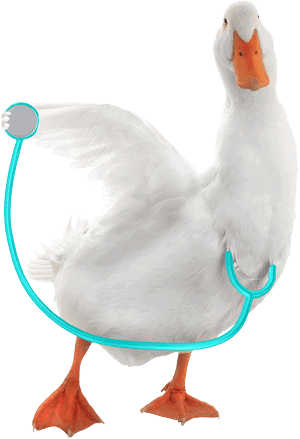
Not sure which course is right for you?
Answer a few easy questions and find out in less than a minute.
What will I study?
FOUNDATION MODULE

This subject is devoted to the correct handling and restraint of the animals in our care. Although a large focus is on dogs and cats, rabbits, guinea pigs, wildlife and birds are also covered. Providing safe and low stress animal handling is a vital skill for any Veterinary Nurse. You will also learn the basics of reading animal body language.

Health and safety are vital aspects of working in any animal care workplace. We’ll introduce you to Work Health and Safety legislation and how it applies to employees, the basics of risk management and controls, how to deal with sharps, allergies, noise, dangerous chemicals and drugs, fire safety and emergencies, biological hazards and zoonoses. Then we’ll finish off with a closer look at animal hazards and manual handling when it comes to animal care workplaces and how you can minimise risks.
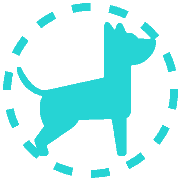
Veterinary nurses care for a variety of animals with differences in anatomy that affect how we nurse our patients. In this subject you’ll learn all about the body systems and how they work. The focus is on placental mammals, and we explore the differences between different animals. You’ll also learn about other non-mammalian species such as reptiles.

Veterinary Nurses are involved in the handling and administration of medications daily. Dispensing drugs also falls to the veterinary nurse often. This subject looks at different drug classifications and schedules, legislation around prescribing and dispensing medications, obtaining information on drugs and client advice.
Chemotherapy is also covered, with an emphasis on the WHS considerations of chemo administration in the veterinary practice, and how to correctly nurse these patients to minimise any risks of exposure when handling them.

Veterinary Nurses are required communicate with a range of people from colleagues to clients. You’ll learn how to adjust your communication techniques to match your audience, including switching between medical terminology and client friendly explanations. You’ll also learn about customer service skills and how to deal with difficult situations.

Patients are often kept in hospital and knowing how to look after them from food to bedding, exercising, taking vital signs, recording observations and knowing when to alert the Vet are all skills that form the basis of good nursing. This subject goes into detail on how to really look after your patients well, providing nursing interventions where necessary, and looking at the patient as a whole – not just ticking off a box that a treatment has been given.
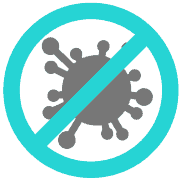
Infection control is extremely important in any veterinary clinic and this subject is structured to help you with understanding both basic and advanced precautions that are necessary to keep you and your patients safe from transmissible diseases.
Well being and Self Care is an important yet often overlooked area of our lives. Allowing ourselves the opportunity for Self Care can sometimes be reflected upon as being selfish, however if we don’t take care of ourselves, how can we take care of others? This is most relevant when considering our clients and patients. Through Self Care and our own wellbeing, we also build our resilience. This enables us to succeed when when we are faced with challenges outside of our control. This subject will guide you through what it means to provide self care, help identify the tools we can use to promote wellbeing and how we can use those tools to apply it to our everyday lives and and our workplaces.
TREATMENT MODULE

Medical Nursing will introduce the student to a wide variety of equipment found within the veterinary clinic. Students study not only how to set it up and what it is used for, but how to assist the Vet during procedures. The correct maintenance of this equipment is also covered.
Fluid therapy and IV catheterisation, oxygen therapy and urinary catheterisation are also covered.

This subject follows on from Foundations of Nursing Care and looks at nursing care plans and nursing interventions.

Correct nutrition is not only vital for the patients we nurse and animals we care for, but advising owners on correct nutrition for their pets is often a daily occurrence for Veterinary Nurses. This subject will ensure students understand what makes up nutrition, how to feed for particular life stages, how to read pet labels, diseases that are influenced by nutrition, and how to calculate energy requirements.
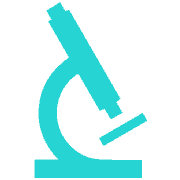
Clinical pathology will introduce students to laboratory techniques used in the veterinary clinic, what equipment is used and how to maintain it including microscopes, refractometers, in-house lab machines, centrifuges etc. Students will also learn how to perform a urinalysis including sediment, PCV/TP, faecal floats, blood smears and will also cover the basics on haematology and biochemistry, and cell structure. Correct sample handling and storage techniques are also covered.

Veterinary Nurses are involvedin a range of diagnostic imaging procedures. You’ll learn about how to set up for, take, and trouble shoot radiographs (x-rays), ultrasound and learn more about other imaging techniques such as endoscopy, MRI and CT scans.

Physical therapy is an essential part of the post op recovery period and an area of care where nurses can be actively involved. Providing physical therapy is a great way to improve owner compliance with post op care, and allow regular contact with the clinic to monitor the patient’s progress. This subject will prepare students to discuss physical therapy with clients, devise routines they can follow, and recognise when to refer to a Veterinary Physiotherapist. It also covers techniques they can implement in clinic to help speed up the recovery of the post op patient. This subject will also teach students about the various muscles and muscle groups.
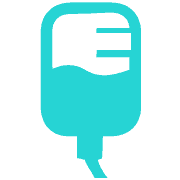
Fluid therapy is an integral part of the modern veterinary clinic. This subject will teach students about the various types of fluids available, their indications and contraindications and how to monitor patients receiving fluid therapy. Students will also learn about osmosis, and how to correctly calculate fluid rates and influencing factors on fluid rates.

Indepth analgesia knowledge and the ability to recognise pain is vital in so many different aspects of veterinary nursing. This subject will teach students about the anatomy and physiology of the nervous system, pain pathways, and the drugs we use to control pain. It will look at recognising pain and pain scoring, and alternative methods of controlling pain in our patients including nursing interventions.

SURGICAL MODULE
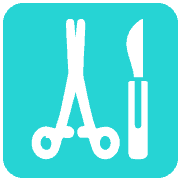
This subject covers how to correctly clean and sterilise instruments as per the Australian Standards and best practice.
Evidence-based veterinary nursing (EBVN) integrates scientific research with clinical expertise to make informed decisions in veterinary practice. It involves understanding what evidence-based veterinary medicine is, recognising various types of evidence and their sources, and asking precise clinical questions. The process includes acquiring and critically appraising evidence, applying the findings to clinical practice, and assessing the outcomes. Literature reviews play a crucial role in summarising existing research, guiding veterinary nurses in making evidence-based decisions to improve patient care.

This subject covers a vast array of surgical topics from asepsis, theatre attire, patient preparation for surgery, pre and post-operative care. You’ll learn about a vast array of surgical procedures, aftercare instructions for surgeries, and how to maintain the theatre suite.
Assisting with surgery starts with the preparation of the surgical team, ensuring that all members are ready and equipped for the procedure. Providing effective surgical assistance is crucial, requiring knowledge of various roles and responsibilities during surgery. The curriculum includes an understanding of suture materials, needles, and staples, along with different suture patterns and knots. These skills enable veterinary nurses to support surgeons effectively, contributing to efficient and safe surgical practices.
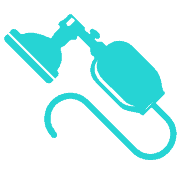
Monitoring Anaesthesia is a large part of the Veterinary Nurse’s job. This subject introduces students to the basics of anaesthesia – how to set up, what circuits to pick and when, how the drugs we use affect the body, and why premedication is necessary. Studying the cardiovascular system is also undertaken as part of this subject. Judgement of anaesthetic depth and monitoring techniques are discussed, from manual monitoring to equipment such as pulse oximetry, ap-alerts, blood pressure, capnography and ECG. Students also learn how to classify ASA statuses, and recognise and respond to anaesthetic complications.
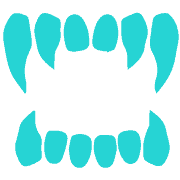
Dentals! You either love them or hate them. This subject will teach students dental anatomy and diseases, how to perform a dental prophylaxis, charting, why extractions are sometimes necessary, and the home care required for dental health, and post op.

Wound Management is an area that nurses can be actively involved in. This subject starts off with learning about the integument system; it then branches into the physiology of wound healing. Students will learn about different dressings and bandages (both techniques and materials), which to use when, and how to decide on a wound care plan in conjunction with the veterinarian.
Setting clinical care standards involves establishing benchmarks for patient care to ensure high-quality veterinary services. This subject covers defining clinical care standards and conducting clinical audits to assess compliance and performance. Developing standard operating procedures (SOPs) and clinical guidelines ensures consistency in care and are explained. Implementing policies, procedures, and guidelines effectively translates these standards into daily practice, promoting optimal patient outcomes and enhancing the overall quality of veterinary care.
RECEPTION AND CLIENT ADVICE MODULE

Almost all Veterinary Nurses are required to perform reception duties. This can cover making appointments, triaging emergency cases, admissions and discharges, clinic records, and some basic office procedures. All of this is covered in this subject along with taking payments, stock control, and banking reconciliations.
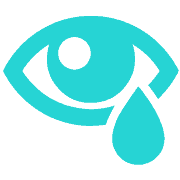
Dealing with client grief requires a whole team approach. In this subject, you’ll learn how to approach the grieving client and provide support within your role as a veterinary nurse. You’ll also learn how to refer clients to additional support.
This subject also covers the euthanasia process.

Emergency nursing can be exciting and very daunting. This subject will teach students how to effectively triage cases over the phone, and in clinic; first aid advice to provide to owner, how to prepare for the arrival of the emergency patient and how to assist the Veterinarian in the management of these cases. Setting up and maintaining crash-carts is also covered along with CPR.

This subject prepares students for recognising, treating and preventing the common parasites found on and in domestic animals. You will also learn what vaccinations animals need, the diseases they cover, and why they are so important. This will ensure you are prepared to educate clients on protecting their pets and family and achieve a high compliance.

This subject covers the reproductive system of common domestic animals, their reproductive cycles and whelping/queening. Students will also learn about reproductive emergencies and what advice should be given to the owners when complications occur or are suspected. There is also an emphasis on understanding what is normal to allow the nurse to advise clients on the correct care of their breeding adults and the neonates.
Providing behavioural advice is often performed by veterinary nurses and having a good understanding of how animals learn and how behaviour modification can be performed is essential for good outcomes. You’ll learn all of this and how to modify common behavioural problems.
CLINICAL EXPERIENCE

The ACVN Diploma of Clinical Veterinary Nursing is delivered entirely by distance education using our online ‘Learning Centre’ and printed learners guides. It gives you the flexibility to study as it suits you without having to attend campus, whilst completing your practical coursework in your own clinic.
As an employed Veterinary Nurse in a clinic, you will complete all your practical components in your clinic. In the event your clinic does not have particular equipment, you may be required to do some work experience at another clinic to cover the necessary skills.

Veterinary Nursing.
It’s all we do.
Why would you study anywhere else?
I’m ready to learn!

start with some savings and no waiting time!
Don’t miss out on this deal!
Pay in full to:
- receive $800 off!
- skip the line and not wait for the next intake!
$8700
$7900
apply now
interest free payment plan
Start your studies at our next intake with a first instalment of $1700
Then simply pay
14 x $500/month or
28 x $250/fortnight
Total:
$8700
Important notes:
- Course costs vary depending on your credits for previous qualifications. Please note: If you have already completed units of competency, you won’t be required to pay for these units or study them again.
- Please budget approximately AUD$200 to $250 for additional textbooks.
- Prices current from 29th May 2024.
- Payment in full discount only available to students who pay the entire course fees upfront in Australian dollars.
Notes on Payment Plans:
- Even if you have completed your studies, you’ll not receive your certificate until you’ve paid for your course in full.
- You are also responsible for paying the entire course cost, even if you decide to not complete the full course.
- Instalments will start from the month your course commences. Payments are by credit card only and must be setup on an automatic plan prior to starting studying.
- If you fall behind in your instalments by more than 14 days without arranging an alternative payment, you may be withdrawn from the course. So it’s important to contact us if you are struggling.

We work hard to ensure our graduates are the first choice for every Veterinary Nurse vacancy!
Our students are raving about our courses!
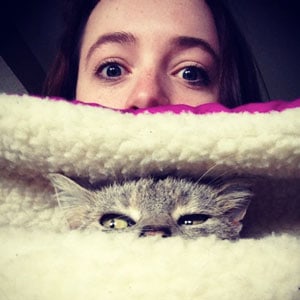
People at the ACVN were so helpful from the beginning. Even when you’re having a bad day and want to throw your learner’s guide at the wall they are there to talk you though everything and make it all better!!! So understanding and compassionate and would do anything to help any of their students. 3 years later with 3 certificates under my belt I am now a fully qualified veterinary nurse. I have landed my dream job and I have never been happier!!
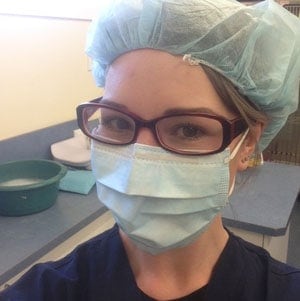
After ten years of unfulfilling retail jobs, I finally took the plunge and enrolled to study vet nursing and haven’t looked back since! The ACVN support network is fantastic! The educators and students are always there to give advice and support, so it never really feels like I am on my own. Studying online especially, pushes me to be more proactive about my education and I think my clinic recognises this and appreciates my dedication to learn.
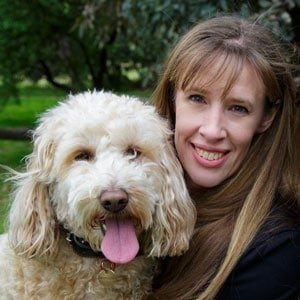
Single mum, mature student (47 yrs old) with two beautiful teenage children. I have always wanted to be a Vet nurse but was squeamish with blood, etc. but after having two kids I “toughened up”. During my studies I have worked in a specialty clinic, and emergency clinic and have finally found my home in general practice which I love. My studies have helped me so much, especially being able to confidently train our trainee nurse. It’s been great to have the study notes to refer back to when needed.
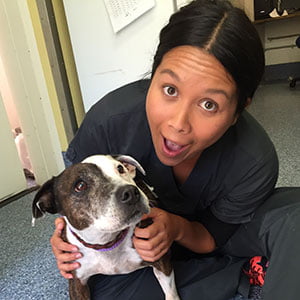
I worked in makeup for fashion and tv for 7 years prior to realising my calling was in the veterinary industry. After researching my options my heart was set on ACVN. I like how in depth each unit is knowing that I am learning absolutely everything I need to take away to become the best vet nurse I can be for my patients. The amazing support and help from the nurse educators really makes a huge difference in the whole experience as well.
OVERSEAS STUDENTS WELCOME!
You don’t need to be living in Australia to study with us. We welcome students from all over the world! You have the same student benefits as a local student, and we don’t charge you huge fees for being overseas. There are however, some considerations you need to factor in before enrolling with us. Please read the Overseas Student Information by clicking the button below.
Learn more

